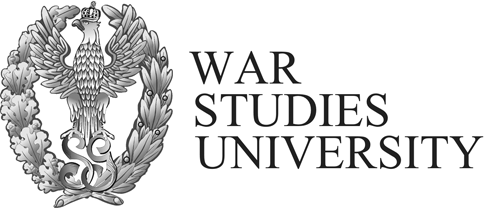Online first
Current issue
All issues
About
Aims and scope
Peer review process
Publication policy and ethics & malpractice statement
Editorial Board
Reviewers
Publisher
Guide for authors
Call for papers
Book Reviews
Special Issues Archive
New and emerging technologies in defence education, training and governance
Non-military aspects of security in the changing international order
Special Issue: Call for papers
International relations in the second decade of the 21st century are undergoing a significant transformation. This process also affects global security in both a classical military sense as well as its broad non-military dimension. Referring to the latter, it should be emphasised that threats have ceased to be of a purely military nature but also refer to social, economic, development and climate factors, even more so now because of the current pandemic. The economic, political, health, and social consequences of the pandemic pose long-term security threats that call for international cooperation.
This Special Issue aims to present interdisciplinary research on the significance and main trends regarding the non-military dimension of security. We seek manuscripts that analyse the scale of threats and dangers as well as related challenges. Articles may highlight the process of institutionalisation in international cooperation or focus on actions taken by major international actors (states, international organisations) in order to counteract these negative phenomena. Finally, we welcome indications to what extent phenomena and processes related to non-military dimensions of security determine or may determine the future international order / balance of power in international relations.
The topics relevant to this Special Issue include, but are not limited to:
1) Non-military dimensions of security – the essence, importance and major trends, especially in the face of the current pandemic
2) Technological, information security, cybersecurity (artificial intelligence, fake news etc.)
3) Climate security (e.g. the position of the G-20 countries with regard to the Paris Agreement on climate change)
4) Ecological security (e.g. drought, marine pollution)
5) Raw materials and energy security
6) Health security and epidemic risk in the context of the global health crisis
7) Food security
8) Humanitarian security
9) Migration as a factor affecting security
Full papers (between 6000 and 10000 words) are invited for potential publication in this Special Issue. All authors must follow Security and Defence “Guide for Authors”. To submit a manuscript, please go to: https://securityanddefence.pl/and select this Special Issue “Non-military aspects of security in the changing international order”. All submissions are subject to standard peer review, revision, and re-submission processes. Please direct any queries to Dr. Kamil Zajączkowski e-mail: k.zajaczkowski@uw.edu.pl
Deadline: 15 September 2020.
Guest Editors:
Wiesław Lizak, University of Warsaw, Poland. Email: wlizak@uw.edu.pl
Kamil Zajączkowski, University of Warsaw, Poland. Email: k.zajaczkowski@uw.edu.pl
Malwina Kołodziejczak, War Studies University, Poland. Email: m.kolodziejczak@akademia.mil.pl
Published papers: Volume 33 Issue 1, February 2021
Table of Contents
Wiesław Lizak, Kamil Zajączkowski, Malwina Ewa Kołodziejczak: Introduction to the Special Issue "Non-military aspects of security in the changing international order"
Zakhar Tropin: Lawfare as part of hybrid wars: The experience of Ukraine in conflict with Russian Federation
Markus Gauster: Ecological threats to security and state resilience in Afghanistan
Oleksandr Karpenko, Aleksander Kuczabski, Vitalii Havryliak: Mechanisms for providing cybersecurity during the COVID-19 pandemic: Perspectives for Ukraine
Sára Gibárti: Aiding Syrian refugees in Turkey: International approaches and domestic policies
Imre Dobák: Thoughts on the evolution of national security in cyberspace
Veronika Deák: Simulation framework for practical cyber security training in the public service
International relations in the second decade of the 21st century are undergoing a significant transformation. This process also affects global security in both a classical military sense as well as its broad non-military dimension. Referring to the latter, it should be emphasised that threats have ceased to be of a purely military nature but also refer to social, economic, development and climate factors, even more so now because of the current pandemic. The economic, political, health, and social consequences of the pandemic pose long-term security threats that call for international cooperation.
This Special Issue aims to present interdisciplinary research on the significance and main trends regarding the non-military dimension of security. We seek manuscripts that analyse the scale of threats and dangers as well as related challenges. Articles may highlight the process of institutionalisation in international cooperation or focus on actions taken by major international actors (states, international organisations) in order to counteract these negative phenomena. Finally, we welcome indications to what extent phenomena and processes related to non-military dimensions of security determine or may determine the future international order / balance of power in international relations.
The topics relevant to this Special Issue include, but are not limited to:
1) Non-military dimensions of security – the essence, importance and major trends, especially in the face of the current pandemic
2) Technological, information security, cybersecurity (artificial intelligence, fake news etc.)
3) Climate security (e.g. the position of the G-20 countries with regard to the Paris Agreement on climate change)
4) Ecological security (e.g. drought, marine pollution)
5) Raw materials and energy security
6) Health security and epidemic risk in the context of the global health crisis
7) Food security
8) Humanitarian security
9) Migration as a factor affecting security
Full papers (between 6000 and 10000 words) are invited for potential publication in this Special Issue. All authors must follow Security and Defence “Guide for Authors”. To submit a manuscript, please go to: https://securityanddefence.pl/and select this Special Issue “Non-military aspects of security in the changing international order”. All submissions are subject to standard peer review, revision, and re-submission processes. Please direct any queries to Dr. Kamil Zajączkowski e-mail: k.zajaczkowski@uw.edu.pl
Deadline: 15 September 2020.
Guest Editors:
Wiesław Lizak, University of Warsaw, Poland. Email: wlizak@uw.edu.pl
Kamil Zajączkowski, University of Warsaw, Poland. Email: k.zajaczkowski@uw.edu.pl
Malwina Kołodziejczak, War Studies University, Poland. Email: m.kolodziejczak@akademia.mil.pl
Published papers: Volume 33 Issue 1, February 2021
Table of Contents
Wiesław Lizak, Kamil Zajączkowski, Malwina Ewa Kołodziejczak: Introduction to the Special Issue "Non-military aspects of security in the changing international order"
Zakhar Tropin: Lawfare as part of hybrid wars: The experience of Ukraine in conflict with Russian Federation
Markus Gauster: Ecological threats to security and state resilience in Afghanistan
Oleksandr Karpenko, Aleksander Kuczabski, Vitalii Havryliak: Mechanisms for providing cybersecurity during the COVID-19 pandemic: Perspectives for Ukraine
Sára Gibárti: Aiding Syrian refugees in Turkey: International approaches and domestic policies
Imre Dobák: Thoughts on the evolution of national security in cyberspace
Veronika Deák: Simulation framework for practical cyber security training in the public service
We process personal data collected when visiting the website. The function of obtaining information about users and their behavior is carried out by voluntarily entered information in forms and saving cookies in end devices. Data, including cookies, are used to provide services, improve the user experience and to analyze the traffic in accordance with the Privacy policy. Data are also collected and processed by Google Analytics tool (more).
You can change cookies settings in your browser. Restricted use of cookies in the browser configuration may affect some functionalities of the website.
You can change cookies settings in your browser. Restricted use of cookies in the browser configuration may affect some functionalities of the website.




